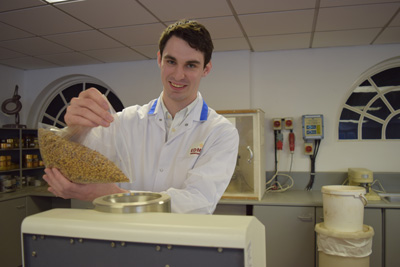Edme taps into the talent of young food scientists
- Like
- Digg
- Del
- Tumblr
- VKontakte
- Buffer
- Love This
- Odnoklassniki
- Meneame
- Blogger
- Amazon
- Yahoo Mail
- Gmail
- AOL
- Newsvine
- HackerNews
- Evernote
- MySpace
- Mail.ru
- Viadeo
- Line
- Comments
- Yummly
- SMS
- Viber
- Telegram
- Subscribe
- Skype
- Facebook Messenger
- Kakao
- LiveJournal
- Yammer
- Edgar
- Fintel
- Mix
- Instapaper
- Copy Link
Posted: 2 June 2016 | Victoria White, Digital Content Producer | No comments yet
Edme recently offered a Nottingham University Food Science student, James Huscroft, the opportunity to get involved in the process validation for WholeSoft….


As part of an exciting product development project, Edme offered a Nottingham University Food Science student, James Huscroft, the opportunity to get involved in the process validation for their soft grain product – WholeSoft.


Student James Huscroft in the laboratory at Edme
James undertook the work at Campden BRI during his third year placement, where he was looking at sterilised and pasteurised foods processed using an industrial pressure cooker, called a retort.
“I was fascinated by the concept of the product, especially from a thermal processing viewpoint,” said James. “So much so, my interest and curiosity lead me to use the project for my Undergraduate dissertation, which included research into new applications for the product.”
Working closely with Campden BRI, James replicated the WholeSoft process using an experimental retort. He looked at the existing process on a new type of grain – naked barley, and compared it to conventional pearled barley – to see whether or not the retention of the bran layer in the naked barley impacts on the heating rates for the product as it is processed. Delving deeper into the functionality of the grains, he also investigated what happens to the starch granules when they are subject to water, heat and pressure simultaneously.
“Good for business”
Commenting on James’ project, Bob Craddock, innovation manager at Edme, said: “It’s so important that the food industry can attract talented young scientists to enter the sector. People often don’t associate food with science, but there are actually a lot of complicated processes that go into most food products – certainly all of ours!”
Mr. Craddock added: “There are scientific breakthroughs happening all the time in the food industry. WholeSoft didn’t exist a few years ago, and now, through James’ research, we know of even more products that can undergo the WholeSoft process. That’s got to be good for business!”
Having completed his dissertation, it’s on to a PHD in process manufacturing for James, who will continue to study at Nottingham University. Ultimately, he is looking to follow in his father’s footsteps and pursue a career in food science.
James concludes “It’s been a fantastic opportunity to learn about an innovative product from a truly incredible and supportive group of people, who were always on hand to help whenever I got caught in a pickle.”




